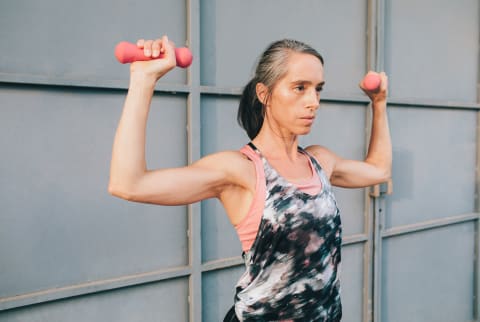
Contributor
By SaVanna Shoemaker MS, RDN, LD
Contributor
SaVanna Shoemaker, MS, RDN, LD is a dietitian and freelance writer whose work has appeared in outlets like Healthline, Greatist, Mashable, Verywell Health and Livestrong.com.

Image by Studio Firma / Stocksy
February 2, 2023
As a society, we are preoccupied with weight and what our weight status means for our health. But more and more research is showing that the number on the scale doesn’t matter as much as other factors, like lifestyle.
A recent study in Nature aimed to shed some light on what influences heart health in women1. Surprisingly, body weight and body fat weren’t at the top of the list. In fact, muscle mass may play a more important role.
Advertisement
This ad is displayed using third party content and we do not control its accessibility features.
Muscle mass matters for heart health.
In the study, researchers wanted to see what played a bigger role in arterial stiffness (an indicator of heart health) for women: cardiorespiratory (heart and lung) fitness or body composition.
The study analyzed 146 women between the ages of 16 and 58. Participants’ cardiorespiratory fitness was measured using an exercise test and researchers also collected their body fat percentage, fat-free mass index (a measure of fat-free tissue—like bone, muscle, and fluid), and mean arterial pressure (i.e., blood pressure in the arteries).
Next, these findings were analyzed alongside the participants’ arterial stiffness to see what associations (if any) stood out.
The two biggest factors associated with arterial stiffness were fat-free mass index and mean arterial pressure. Specifically, a higher fat-free mass and a lower mean arterial pressure were both linked to lower arterial stiffness.
This held firm in the study regardless of body fat percentage, but older age was linked to arterial stiffness. That means the amount of fat-free mass (like muscle) you carry may play a bigger role in heart health than body fat or total body weight, but age plays a factor as well (something to keep in mind, as women tend to lose muscle mass as they age).
Building muscle through targeted lifestyle changes—e.g., weight training and eating more protein—is a reliable way to increase your fat-free mass.
However, it’s important to remember that this study was observational, so we can’t know for sure that improving muscle mass will always result in better heart health.
Metabolic health is about more than weight.
Arterial stiffness2 is a precursor of heart disease, and could signal other health problems as well. Healthy arteries are flexible, allowing them to widen or constrict easily to regulate blood flow and blood pressure.
Here are a few ways we can support our arterial and metabolic health to decrease our risk of heart problems, without giving body weight more attention than it deserves.
Advertisement
This ad is displayed using third party content and we do not control its accessibility features.
Resistance training.
Resistance training can help increase muscle mass, which offers huge metabolic benefits3.
If you’re not a fan of weights or standard bodyweight moves, that’s OK. Workouts like barre, pilates, and yoga can help you build strength too.
Eating for health, not weight.
We should eat for health—not for weight loss. Making the choice to eat whole, nutrient-dense, minimally processed foods4 can help your body become its healthiest, even if your weight doesn’t conform to societal expectations.
Additionally, making sure that your diet contains plenty of protein from high-quality animal or plant sources ensures that you have the raw materials necessary to build new muscle5.
Advertisement
This ad is displayed using third party content and we do not control its accessibility features.
Consider targeted bioactives
Ingredients like green tea leaf extract, cayenne pepper, grains of paradise, and veld grape extract can help support metabolic health holistically, further bolstering muscle mass goals. You can find these ingredients (and other all-stars) in our favorite metabolic health supplements, found here.)
The takeaway.
Weight shouldn’t be your only consideration when it comes to health; metabolic health is multifaceted and far more nuanced. In fact, it’s better to focus first on healthy behaviors.
According to this study from Nature, muscle mass may be one lever that women can control to help improve their overall heart health—especially later in life. To increase your muscle mass, make sure that you’re incorporating strength training regularly and eating plenty of high-quality protein.
Other things you can do to optimize your metabolic health? Consider adding a premium metabolism supplement to your wellness regime; eat well by prioritizing nutritious, whole foods; hydrate properly; and make sure to get enough deep, restful sleep. Simply put, your weight doesn’t have to carry so much weight in the equation.
Advertisement
This ad is displayed using third party content and we do not control its accessibility features.
